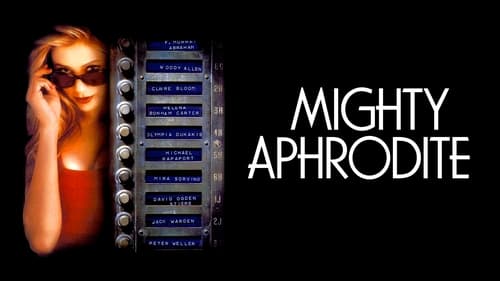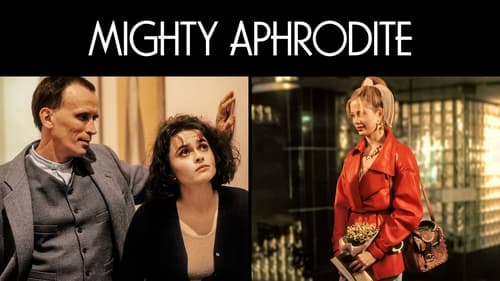SincereFinest
disgusting, overrated, pointless
Kidskycom
It's funny watching the elements come together in this complicated scam. On one hand, the set-up isn't quite as complex as it seems, but there's an easy sense of fun in every exchange.
Melanie Bouvet
The movie's not perfect, but it sticks the landing of its message. It was engaging - thrilling at times - and I personally thought it was a great time.
Sameer Callahan
It really made me laugh, but for some moments I was tearing up because I could relate so much.
ElMaruecan82
For all its good intentions, witty humor and optimistic spirit, "Mighty Aphrodite" incomprehensibly falls flat for me. I use this adverb because I'm a fan of Woody Allen's work, to the point I tended to ask myself what's wrong with me, instead of the film. Though I can't really say I didn't enjoy the film, but the enjoyment was hanging on this very particular relationship between Woody's character Lenny and the cheerful prostitute named Linda, and my appreciation depended on the way all the players would handle that interesting dramedy.Regarding Linda, she's played by Mira Sorvino, daughter of actor Paul Sorvino, the unforgettable Paulie in "Goodfellas" and she wasn't bad either. Her performance earned her an Oscar-win and the sole awards recognition of her career, I wish I could use more enthusiastic superlatives, but in my humble opinion, just because she was the highlight of the film (and yes, she was) doesn't mean much when the rest doesn't aim very high, by Allen's standards. She stole the show, she had a fantastic presence and comical timing and was probably worthy of her Oscar nod, but she didn't create something we hadn't seen before, anyway, not after Whoopi Goldberg, Julia Roberts, Marisa Tomei or Judy Davis.Of course, her performance was integral to the psychological interest of the film, because she starts as your usual not-too-bright hooker with a heart-of-gold, and progressively displays a deeper and sadder personality. But let's face it, this is not the most revolutionary character's arc for a prostitute and the main problem is that Woody Allen drives it for the most frustratingly conventional reasons instead of using the plot devices the film asked for, or to be blunter, of exploiting the very psychological mood he was caught up into after his separation with Mia Farrow and the controversy about his "adoptive daughter". I can understand he chose to swim in safer waters but it deprived the film from what could have been an interesting character study, not devoid of humor when handled by the talent of Allen.So, let's get back to the story: you have a sports reporter married to an ambitious artist and soon-to-be gallery owner, Amanda, played by Helena Bonham Carter. She wants a child, but she's in such a turbulent time of her life, she decided to adopt one. At first reluctant, Lenny instantly loves the little boy and the first segment of the film is pure Allenian comedy. What comes next isn't the less interesting: the boy turns out to be a very good-looking and intelligent kid and a constantly impressed Lenny, became a doting father, at the expenses of his marital relationship. In a short sequence that doesn't strike for its 'Annie Hall' subtlety, we understand that the couple comes across a marriage crisis, and even in bed, nothing works.Lenny transfers his fading love from Amanda to the eventual mother of Max, and decides to find her. He ends up meeting Linda Ash, a failed actress turned into porn star and prostitute, personality and eccentricity-wise, she's like Phoebe Buffay hadn't she got her "Friends", sweet, caring and lucid enough to see that Lenny is a loser, in a quest of a woman who can provide some special treats. At this part of the film, the script develops a great friendship story reminiscent of Jack Lemmon and Shirley MacLaine in "Irma la Douce", and it's quite touching when he tries to comfort her or help her to find the true love. There was one thing missing though to allow Sorvino to transcend the predictability of her character (the prostitute who wants the fairy tale), she needed at least to have a hint about her son's identity.As if Allen was aware that this would be expected from viewers, he leads the film to some sort of ironic ending, which is satisfying in the sense that it's the only acceptable resolution of a story that oscillated so much between tragedy and comedy (so, yes, the ending is full of witty irony and I give him the credit for that). But it's a rather empty nutshell that doesn't give you as many insights about love and hubris as his brilliant "Husbands and Wives". At this point of the review, I have to mention the Greek chorus, a creative artistic license, commenting on the universality of the themes handled by the story, but I thought this device was slightly overused by the end, and drove the story to levels of parody that didn't fulfill the emotional potential of the drama. Or maybe am I the only one seeing this potential?To me, when you have a character who's obsessed by the identity of the mother of his adoptive son, it's very revealing of his opinion about his wife, when you think about it. Lenny doesn't even consider the possibility that the good genes might come for the father, and the way this part is left unanswered can be taken as plot contrivance except if you consider the feelings Lenny has towards his wife, and see reasons for his dismissing her maternal quality. In the case of Woody Allen, you can almost psychoanalyze it and see underneath the investigation lead by Lenny, an attempt to dissociate the daughter he was in love with, with her mother, and by that process, stop feeling guilty about his own relationship, there's a part of hubris behind that. And maybe this was too ugly material to handle in a comedy.Or maybe it could have worked, had it permitted the confrontation between the kid and any of his mothers (we never quite see him interact with Amanda), instead of using as a MacGuffin for the friendship story between Lenny and Linda, and the ensuing love triangles, handled with delicacy and good humor but nothing very revolutionary. In the end, what could have been an interestingly cathartic dramedy of Woody Allen, became "that movie" that earned Mira Sorvino her Oscar.
Predrag
This one is a sure hit. Mighty Aphrodite is a modern myth, ingeniously told through the lens of classical Greek mythology, about a man who sets out on the fabulous quest for beauty. Woody is a father who tries to find the mother of his adopted son, in the belief that the mother of the child he idolizes will represent perfection. As always in Woody's world, things don't quite turn out as planned.Mira Sorvino is incredible. She's not a "hooker with a heart of gold", not by any means. She's not your typical jaded-whore type either, she just lacks any moral squeamishness when it comes to what she does. She's actually a pretty complex character, so many usually discordant aspects live side-by-side, without being cliché. The ending has a wrap-up from the chorus leader that kind of tells you why the movie is so great, in case you didn't get it. The results of this endeavor are quite hysterical and unexpected, so check it out. It makes a nice statement on love and fidelity and parents and children and irony, and on fate, as I suppose all of Woody's films strive to do. Lighthearted, fast, and funny.Overall rating: 8 out of 10.
Desertman84
Woody Allen stars in his latest picture that he also wrote and direct as Lenny, a New York sportswriter bored by his wife and attracted to a hooker that happens to be the mother-though she doesn't know it-of his adopted son in this film,Mighty Aphrodite.Together in the cast with Allen are Woody Allen,Mira Sorvino,Helena Bonham Carter,Michael Rapaport and F. Murray Abraham.Lenny is trapped in a bad marriage to high-strung art dealer Amanda, but he finds solace in his relationship with his adopted young son. Indeed, he grows so fond of the boy that he decides to track down the boy's real mother, expecting to discover a brilliant professional. Instead, he finds Linda, a ditzy prostitute and porno star who mingles casual vulgarity with disarming innocence. Despite his initial disillusionment, Lenny soon develops a fondness for Linda and decides to play matchmaker, setting her up with a handsome young boxer who is equally good-hearted and scatterbrained. While the contrast between the free-spirited Linda and the uptight Lenny provides the bulk of the laughs, hints of Allen's more literary humor are also present, particularly in the scenes involving a roaming Greek chorus commenting upon Lenny's fate.This is a surprisingly sweet and brilliant film with great performances particularly that from Mira Sorvino,who portrayed a bubble-headed hooker and porn star.It has a nice combination of smart comedy and some of wacky energy.It is a delight to watch.
jzappa
Woody is a realistic idealist, because to persist making contemplative films is to assert how buoyant you actually are. His buoyancy is not to be associated with that articulated by his more hopeful characters. The average rubrics of idealism and cynicism offer fertile readings of several of his later films. How best to support such analyses? The views to be favored are those that fall back neither on some proclamation of, or biographical facts about, the creator, nor to the partialities of the interpreter. Allen's work helps us sidestep both of these moves: the biographical myth and the reading of a connotation into the content instead of interpreting what it might have to say, because he presents the alternatives of optimism and pessimism in dramatic rather than discursive ways. This enables him to be detached from positions held in the material, clear in his practice of the drama of knowledge shared by the audience but not by all of the characters. It makes the assertion that getting on with one's life is a remedy for pessimism. Thus realistic idealism: It's worthwhile to carry on.This modern playing-up of Pygmalion divulges its solemn undercurrents, with observations by the Greek chorus, which periodically bursts into song and dance, while in unison developing a plot that lends itself to farce, Woody playing a sportswriter who's initially opposed to adopting a kid despite his career-driven wife Helena Bonham Carter being unable to get pregnant for the sake of her job, yet she has her way and they adopt a boy they call Max. As Max gets older, it becomes clear he's exceedingly gifted, and Woody becomes preoccupied with learning the identity of Max's biological mother. After some tense scenes of farcical suspense, Lenny finally locates Max's mother, Linda, call girl and part-time porn actress. Lenny, never disclosing his real reason for seeking out Linda, swiftly becomes her friend and counselor, and sets about finding a nice guy for her to marry. Lenny recommends a young boxer he knows, a potato farmer from upstate, who is a good kid but not very smart.Although the increasingly colloquial Greek chorus might sound like a cumbersome adjunct to a Woody Allen comedy about contemporary Manhattan neurotics, it truly works properly. Chorus members including F. Murray Abraham, Olympia Dukakis and David Ogden Stiers make urgent notes of the choices Lenny is making, and their peculiar counterpoint helps Allen pull off some of the more clearly perfunctory plot developments. By the end of the movie, when the deus ex machina arrives from the sky in a helicopter, it feels like an stimulation rather than what it is, an expedient plot device.As Linda, then 29-year-old Mira Sorvino's voice is heavy Brooklyn lightened by helium and thus made comic, which mitigates the explicit casual vulgarity of her lexicon, making it seemingly naïve. Her Oscar win has apparently been subject to the same "come-on's" and "gimme-a-break's" as Marisa Tomei's for My Cousin Vinny, perhaps because young bimbo roles, including those of Brooklyn spitfires, are often so two-dimensional, they're all taken for granted as precisely that. But known for being remarkably dignified and eloquent, Sorvino goes way outside the hooker-with-a-heart-of-gold peripherals of the part in developing a genuinely sensitive and charming character.Through events that I won't divulge, Woody brings us to an addendum set a few years later, when Lenny and Linda meet again, and there is a bittersweet development in both of their lives, although each of them is conscious of only half of it. The movie's closing scene is calmly, pleasingly poignant, and the whole movie avoids the snags of pessimism and becomes something the Greeks could never completely handle, an impending tragedy with a hopeful ending.Feels like Woody's just treading water here, but even when it becomes unquestionably frivolous, Mighty Aphrodite remains an attractively made, swift, lighthearted dessert that transpires as pleasant mid-range Woody. He's best known for this spirit of romantic comedy, having transitioned from broad screwball to more storied and romantic films. Mighty Aphrodite, during his freshly post-Farrow period of varied sorts of works, is generally inclined at a gratifying and more or less reliable reading.







